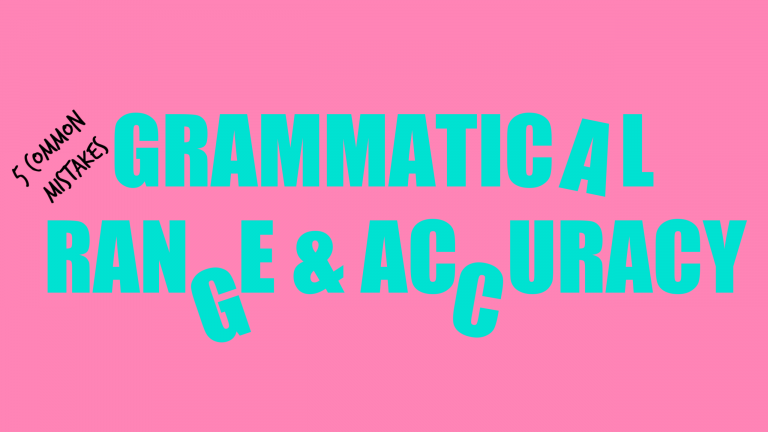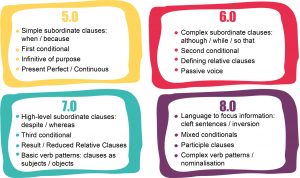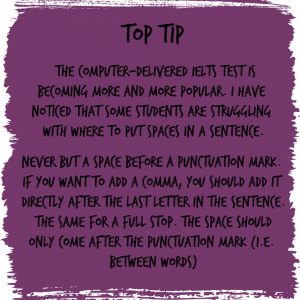
5 Most Common IELTS Grammar Mistakes
Hey! Grammatical Range and Accuracy makes up 25% of your IELTS Writing and Speaking scores so should be a very important part of your preparation. Today, I want to look at the 5 most common IELTS grammar mistakes that I see when marking students essays to show you how you can avoid them.
Your IELTS grammar score is calculated using two broad criteria – range and accuracy. Very simply, this means that to achieve a high score, you will need to show the examiner that you can
- write a number of different types of complex sentences (so not just the same one again and again). This is range.
- and that you can produce them without errors. This is accuracy.

Every year I mark literally thousands of IELTS writing scripts, and it is amazing how often I see the same grammar mistakes again and again, no matter what the nationality of the writer. So, in today’s post, I want to show you the 5 most common IELTS grammar mistakes and, more importantly, how to avoid them!
1. Not having enough C1 level sentences
Complex sentences are the key to a high grammatical range and accuracy score. However, not every complex sentence has the same “value” in the exam, as some are harder to form than others. Think about it – I bet that you learned to use “because” in one of your first lessons as an Elementary student. However, I expect it was months or even years before you were introduced to “despite”. Even though both subordinators are used to create complex sentences, it is obviously much easier to write a reason clause with “because” than it is to create a concession clause with “despite”.
If you need a 7.0 in IELTS, you will need to show a range of C1-level sentence structures. There is no official ‘list” of what these are, but here are some examples of what different sentence structures would be classed as by an IELTS examiner:

Please note that not every sentence in your essay needs to be in the 7.0 or 8.0 range for you to achieve these scores! Good essays usually have a mix of all types, but at least one or two in the higher-levels to get a top score!
My advice is always to focus most on making a clear argument than trying to “force” grammar structures into your essay.
2. Not having a wide enough range of sentence structures
This is a problem that I see time and again in students’ essays and is one that can be hard to spot if you are not aware of it. Make sure that you have a good mix of sentences. It is OK to have two examples of the same sentence structure (for example, two sentences that use “because” or “while” or two conditionals or relative clauses) However, if you use a relative clause to extend EVERY idea in your essay, then you are not showing the examiner enough range to give you a high score.
Think of it like this – the examiner can only “pay” you for each type of sentence ONCE.
If you write a great inversion sentence that starts with “Not only” in the body of your essay, then the examiner cannot give you more points for having another one in your conclusion!
Go and get one of your recent essays and highlight all of the complex sentences. Are they all the same or do you have 5 or 6 different types? If you find that you have the same types, don’t worry! Use the chart above to help you include a wider range in your next essay.
3. Not having enough error-free sentences
Obviously the main problem students face with grammar is being able to construct sentences that are error-free. Yes, you have studied the rules for months, maybe even years, but putting all of that information together in the exam room can be difficult. It is especially difficult when you are also focusing on addressing the question, joining your ideas and having a wide range of lexis!
Honestly, the only way that you are going to be able to write enough error-free sentences in the exam is practice. The good news is that while you really do need a specialist IELTS teacher to help you with Task Response/Coherence and Cohesion almost any English teacher can help you improve your grammar.
If you don’t know your current level, then why not go and take my IELTS Grammar test to see where you stand at the moment? It is a quick way to find out if you 5.0, 6.0, or 7.0 at the moment!

However, although every student is different, I know from experience that there are three areas that are pretty much ALWAYS a problem, no matter how strong a student is.
- Articles –
using a / an / the / – correctly is a life-time struggle for almost every student. Honestly, examiners expect to see
one or two errors here, so this won’t stop you getting a 7.0 or higher. However, if you have an error in every sentence, then you are going to struggle to higher than a 6.0, even if you show a good range of sentence structures. Watch my FREE video lesson for help here – it goes through the 5 general rules that you will need to use in every essay, plus the specific rules that can make the difference between a 7.0 and an 8.0. - Subject / Verb agreement – no matter how good your level, you are probably still in danger of writing sentences that contain an agreement error. In English, the subjects of our sentences have to agree in person and in number with the verbs/nouns that we use. Did you know that sentences that start with gerunds should have a SINGULAR verb? I bet you didn’t! For more tricky rules like these, have a look at my subject / verb agreement blog post
- Writing Poor Contrast Sentences –
being able to show contrast in your essay is an absolute necessity. However, so many students make errors here. Did you know that you can NEVER put a comma after “while” or ‘whereas” in a sentence? Or that you can NEVER use “although” and “but” in the same sentence? Or that “despite” can be followed by three different grammatical patterns, but NEVER just a normal sentence? I can go on and on with potential problems with contrast clauses, but the best way to learn these rules is to complete my free video lesson (and do the practice activities!)

Listen to Nick and I discuss three common grammar errors in this episode of the My IELTS Classroom podcast:
4. Having sentences that contain too many clauses
I would say that the biggest misconception about grammar is that longer is better. I mean, if a complex sentence with two clauses is good, then one with three or four must be brilliant, right? Wrong!
Complex doesn’t mean long and complicated. Remember, the main purpose of any sentence in an essay is to COMMUNICATE MEANING. Sentence structures are just tools that you can use to convey your argument in the clearest way possible.
Long sentences are hard to process
The human brain finds it hard to process massive amounts of information in one sentence. Plus, the more clauses you add to a sentence, the higher the chance of making an error. I would generally say that three clauses is the most you will ever need in a sentence. If you write more than this, think about separating the sentence into two shorter ones. This will often result in sentences that are easier to digest, and more likely to be error-free.
5. Poor punctuation
I’m going to be honest with you – most native speakers have no idea about punctuation rules. Some sprinkle commas all over their writing, others use none at all. And whilst a handful of my friends might know when to use a semicolon, the vast majority wouldn’t even know what one was, let alone how to use it!
Listen to Nick and I discuss punctuation in this podcast epidodes
It is rare for punctuation to have a really detrimental effect on a student’s score but, when it does, it is usually because a student has tried to add TOO MUCH punctuation rather than too little. An extra comma where one is not needed is nine times out of ten much worse than a missing one.
Honestly, it would be better to write a whole essay with NO commas than one with too many! If I had to give one tip for grammar it would be: KEEP IT SIMPLE. I genuinely believe that the only punctuation marks you have to master for a high score are:
- capital letters
- full stops
- commas
- apostrophes
There is really no need for a semicolon – these tend to overcomplicate your sentences and the rules are so confusing that the chances of you using these correctly are next to none.

5 Most Common IELTS Grammar Mistakes
- Not having enough C1 level sentences – you have to have some B2 or C1 level sentence structures to get a 6.0 or a 7.0 for GRA. If you don’t recognise the types of sentences in my chart, then sign up for some English classes
- Not having a wide enough range of sentence structures – are you using the same types of sentences again and again? This is going to limit your score. The examiner can only “pay” you once for each type of sentence, so make sure you show them as many as you naturally can.
- Not having enough error-free sentences – range is great, but if you have an error in every sentence, then you are going to get a lower score than you deserve. Try to balance range with accuracy
- Having a sentence that contains too many clauses – long is not always best! If you have a sentence with more than three clauses, consider breaking it into two shorter sentences that can be more easily understood (this will improve your Coherence and Cohesion score!)
- Poor punctuation – with punctuation, less is more. Do not try to include semi-colons – you probably won’t use them correctly and it will do nothing to increase your score. Just learn how to use commas correctly and make sure you use capital letters and full stops.
I hope that you found this useful. Grammar is my passion and I love nothing more than sharing my knowledge with my students. I discuss all of these issues and many more in my 10 hour B2/C1 level IELTS grammar course.
Plus, if you struggle with any other grammar point, leave a comment below and I will try to cover it in a future post 🚀
